#predicate logic
Explore tagged Tumblr posts
Text








god. what even is finals week.
#studyblr#aesthetic#studying#studyspo#mathblr#100 days of productivity#dark academia#study#music#reading#logic#formal logic#predicate logic#propositional logic#econblr#economics studyblr#econ studyblr#freshman#college freshman#cats#college#study cats
16 notes
·
View notes
Text
I prefer to use predicates but also embed the conditional into the quantifier.
(∀x∈robots)[trans(x) ∧ gay(x)]

4K notes
·
View notes
Text
The Philosophy of Universal and Existential Quantifiers
The philosophy of universal quantifiers and existential quantifiers deals with how these logical tools are used to express general and particular statements, respectively, and the implications of their use in formal logic, mathematics, and philosophy. These quantifiers are fundamental in the study of logic, helping to clarify the structure of arguments, the nature of truth, and the meaning of propositions.
Key Concepts in the Philosophy of Quantifiers:
Universal Quantifier (∀):
Definition: The universal quantifier, denoted by ∀, is used to express that a statement is true for all members of a particular domain. For example, the statement "∀x (P(x))" means "For all x, P(x) is true."
Example: In a mathematical context, "∀x (x > 0 → x² > 0)" means "For all x, if x is greater than 0, then x squared is greater than 0."
Philosophical Implications: The use of the universal quantifier is central to discussions about generality and the nature of universal truths. Philosophers debate whether statements involving universal quantifiers reflect objective truths about the world or are simply linguistic conventions.
Existential Quantifier (∃):
Definition: The existential quantifier, denoted by ∃, is used to express that there is at least one member of a particular domain for which a statement is true. For example, "∃x (P(x))" means "There exists at least one x such that P(x) is true."
Example: In mathematics, "∃x (x² = 4)" means "There exists an x such that x squared equals 4," which would be true for x = 2 and x = -2.
Philosophical Implications: The existential quantifier raises questions about existence and the ontological commitments of statements. When we say "There exists," what kind of existence are we affirming? This leads to discussions about the nature of existence in various domains (e.g., mathematical, physical, abstract).
Scope and Binding:
Scope: The scope of a quantifier is the part of the statement to which the quantifier applies. Understanding the scope is crucial in determining the meaning of logical expressions.
Binding Variables: Quantifiers bind variables, meaning they specify the domain over which the variable ranges. A variable within the scope of a quantifier is considered bound by that quantifier, whereas a variable outside its scope is free.
Quantifiers in Formal Logic:
Predicate Logic: Universal and existential quantifiers are central to first-order predicate logic, where they allow for the formulation of complex statements about properties and relations. Predicate logic extends propositional logic by including quantifiers and variables that can represent objects in a domain.
Truth Conditions: The truth conditions of statements involving quantifiers depend on the domain of discourse. A universally quantified statement is true if the predicate holds for every element in the domain, while an existentially quantified statement is true if the predicate holds for at least one element.
Philosophical Debates:
Quantifier Variance: Some philosophers, like Hilary Putnam, have argued for "quantifier variance," the idea that the meaning of quantifiers can vary depending on the context, and that different ontological commitments can lead to different interpretations of what exists.
Ontological Commitment: The use of quantifiers in logical expressions often implies certain ontological commitments. For example, stating "∃x (P(x))" suggests a commitment to the existence of at least one object in the domain that satisfies P(x). Philosophers debate whether such commitments are necessary or merely linguistic conventions.
Free Logic: In response to issues of ontological commitment, some logicians have developed "free logic," which allows for the use of quantifiers without assuming the existence of the objects they quantify over. This is particularly relevant in discussions about non-existent or hypothetical entities.
Applications in Philosophy:
Philosophy of Language: In the philosophy of language, quantifiers play a crucial role in understanding meaning, reference, and truth. Debates about the semantics of natural language often involve how universal and existential quantifiers are used in everyday speech.
Metaphysics: Quantifiers are central to metaphysical debates about universals, particulars, and the nature of existence. For instance, discussions about whether universal statements (like "All humans are mortal") are necessarily true, and what that says about the nature of humanity and mortality.
Epistemology: In epistemology, quantifiers are involved in formulating theories of knowledge. For example, when discussing the extent of human knowledge, philosophers might use universal quantifiers to express general knowledge claims or existential quantifiers to assert the existence of specific knowledge.
The philosophy of universal and existential quantifiers is foundational to logic, mathematics, and philosophical inquiry. These quantifiers allow us to express general and particular statements, clarify the structure of arguments, and explore deep questions about existence, truth, and meaning. Their proper use and interpretation are crucial to understanding not only formal systems but also the nature of reality and our linguistic practices.
#philosophy#epistemology#knowledge#learning#education#chatgpt#ontology#metaphysics#Logic#Quantification Theory#Predicate Logic#Universal Quantifier#Existential Quantifier#Ontological Commitment#Quantifier Variance#Philosophy of Language#Truth Conditions#Scope and Binding#Free Logic#Formal Semantics#Mathematical Logic
1 note
·
View note
Note
im really sorry if this question ends up being repetitive: but, if not for bruce’s over reliance on dick to regulate his thoughts and emotions, why would dick grow up into feeling like he needs to repress his emotions so much and his eagerness to act as people’s support? i know youve spoken about wolfman and his altering of their relationship but if ntt is generally an accurate portrayal of an adult dick, to me this nevertheless sounds like the consequences a parent-child relationship where the responsibilities are titled too much towards the child
i suppose this could also segue into asking for recs that would help me better understand your interpretation of their relationship 👀
not repetitive at all! to me the irony of wolfman's depiction of dick lies in that it is simultaneously something you can logically ascertain from prior canon but not for the reasons actually presented by wolfman. if that makes sense. he does extra work that isn't actually necessary to help explain why dick would act the way that he does because there's plenty of reasons for it without rewriting his history with bruce to have always been suppressed and edgy and dark. to me it makes far more sense to capitalize on the inevitable disconnect between bruce and dick as an adult and a child. batman: full circle is a good example of that dichotomy (and although it was published in the early 90s it built on mike w. barr's prior understanding of the relationship between dick and bruce that he wrote into the early 80s). bruce's primary concern for the people he works with is never standards or finesse but safety. he worries constantly about others coming to harm under his watch and with a child in particular those worries were exacerbated. he ran a tight ship not because he believed dick had anything to prove but because the only way dick could keep being robin was if he went about it safely. that was obv easy for an adult to understand. but not so much for a child
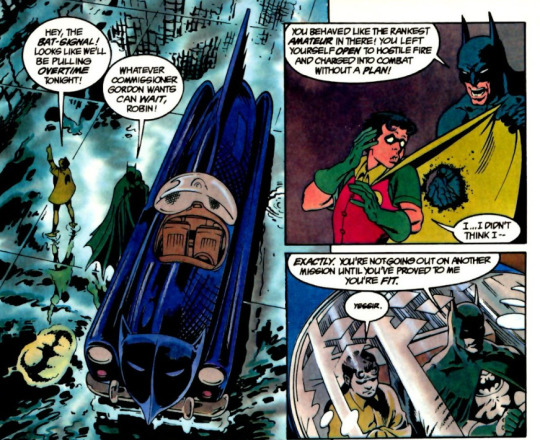
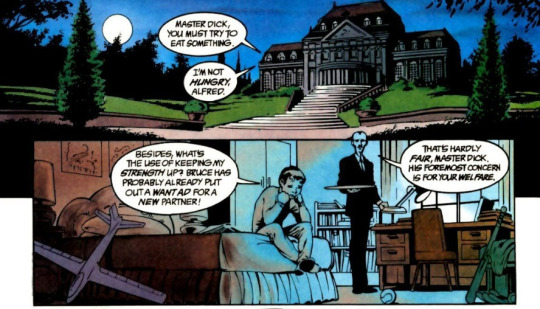
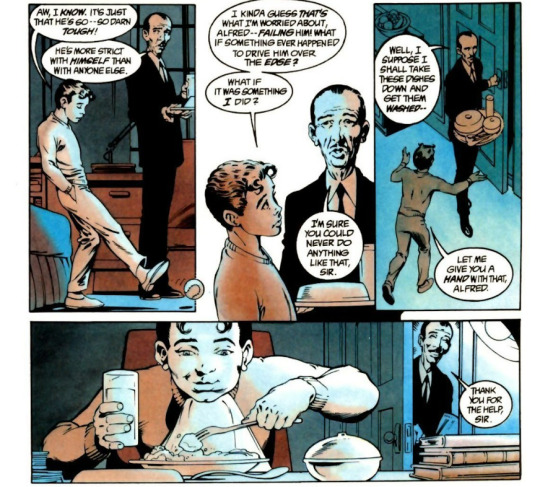
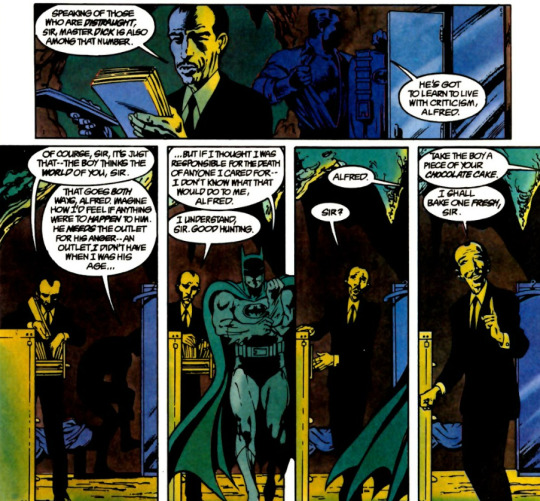
to bruce these worries were practical and par for the course (as well as an expression of his love and protectiveness) but for dick their consequences formed the crux of his entire world. as a child he idolized everything about bruce. his heroism. his work ethic. his skill. his resolve. his preparedness. if dick couldn't live up to the standard he set for himself in idolizing bruce then what could he ever hope to amount to? that was the thought constantly going through his head. and it's why the bulk of his childhood and primary tenure as bruce's partner was so precariously protected by the fact that nothing bad ever really happened during it (and admittedly this framing is convenient because even chronologically speaking nothing very significant happened in their history with each other until dick left for university in 1969) (i know dixon opted to write that whole shtick with dent in his version of events but personally i never found it necessary to do so). there is enough there in the idea of dick working hard for the course of a decade to embody who he believed bruce to be that lends itself to it eventually being difficult for him to healthily express himself once the rift between them actually began to emerge
because what about bruce was there to actually see that was broken and dark before dick became an adult? i know a lot of dick fans hate batman #408 because they don't like that it enforced "retirement" upon dick (which i personally believe is a conclusion they come to because of the way batman #416 re-framed the same scene) but to me that's an inaccurate reading of the text. batman #408 was about bruce (admittedly far too belatedly) recognizing that he could not in good conscience continue to ask dick to go out and be a vigilante on what he considered to be his own "orders". he viewed dick's close call with death at the hands of the joker as something directly of his own making. although their tenure with each other had been wonderful if dick wanted to continue to be a vigilante it had to be on his own terms and of his own volition. obv that was logical to bruce and it was something dick managed to accept in the moment. but it's still hard to go from always having a purpose alongside someone you idolized to finally being entrusted entirely to forge your own
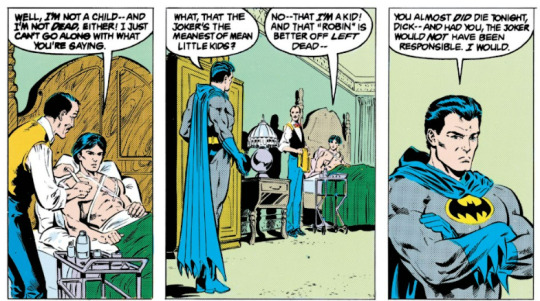
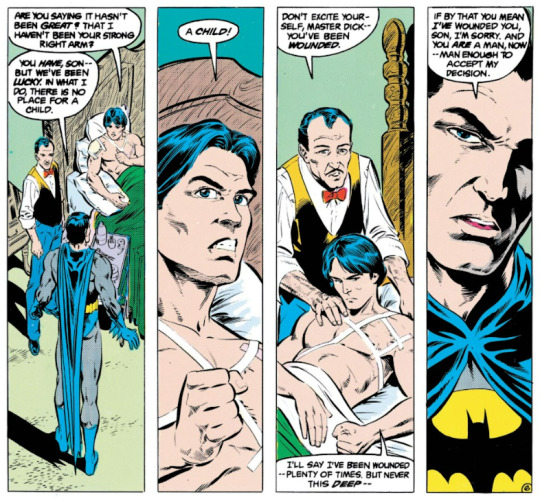
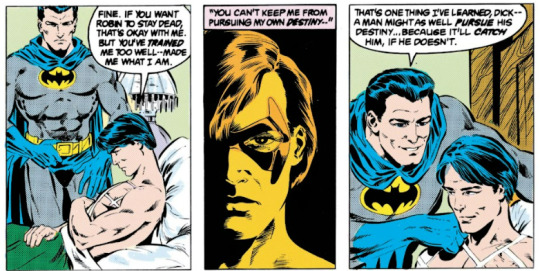
in general i like the idea of dick the adult becoming privy to all of the personal problems and conflicts that come with being a vigilante. he was conveniently shielded from a lot of those problems as a child because all he had to do was be bruce's partner and hope to live up to the title. bruce had no reason to trauma dump on him or talk about his worries and concerns at length with him because it was never supposed to be dick's job to field those worries and concerns in the first place. he was a child. the only thing bruce wanted to do was to help channel his emotions through an outlet and provide him with a home to grow up in. but when you become an adult often that dynamic shifts. you're still not responsible for fielding those worries and concerns but you can perhaps be trusted with them. that's why i like the framing in batman #408 of dick now being a man. it's a subtle way to frame the double-edged sword of adulthood. the world is in your hands now but so will be the horrors that come with it. coming to terms with the real world that bruce lives in should be hard for dick. coming to terms with who bruce is when he's not perfect should be hard. coming to terms with how quietly bruce kept his grief because he did not see fit to overwhelm a child with it should be hard. that dichotomy of dick both wanting to be bruce's brother and his son should form the crux of their conflict with each other because you can't hope to be someone's equal and someone's protected at the same time in that kind of relationship. for dick to transition into the position of equal he has to expose himself to the fact that bruce is not in fact an idol but someone irrevocably human. and that should interfere significantly with his head and his own standards for himself
#all of this to say. i don't think it's so much about pre-ntt canon directly predicating ntt-dick's characterization#like it's not these events happened in the 60s and 70s so that's why he acts this way in the 80s#it's more the opposite. because these things Didn't happen in the 60s and 70s. that's why being on his own in the 80s is hard#dick wants so badly to be bruce's equal and an adult and a leader and someone trusted by others#but those are all things easier said than done. and the worst tragedy of it is that the bruce dick knows from childhood#is not the bruce he knows in adulthood. they are from the same person. but they are still different#because there are things dick is allowed to see as an adult that bruce spared him from when he was a child#and on one hand that was the right thing to do. but on the other hand it's devastating. because dick obv doesn't know how to cope#how do you cope with the fact that your decade-long idol is not in fact what you made him up to be#(and the thing is it's not that bruce isn't what dick made him up to be) (it's that he's also other things)#(he's sad. he's guilty. he's exhausted. sometimes he doesn't know how to go on)#reconciling with those realities should be unbearable for dick. because being robin has given him so much purpose#and while being batman gives bruce purpose too there are also so many times where he absolutely bends under the weight of it#and that sight should be frightening to dick#that's why i really like knightfall. or the potential of it because i mean prodigal did not deal with the aftermath of it#in a way that i liked at all. it was quite underwhelming#and then you guys obv know my issues with the framing of dick's reaction to jason's death and his conversation with bruce there#but the idea of dick needing to cope with bruce being a human capable of breaking under his own imposed duties is impt#and so my reading of their relationship is less about things written explicitly in text and more about drawing logical inferences#idk. i feel like i am all over the place i'm not sure if this sufficiently answers your question i'm sorryjgfkldghf#outbox
18 notes
·
View notes
Note
You write thorough analyses of concepts and events, so I thought I would ask for your take on Senator Booker's speech today. Some people say it was disrespectful. What do you think? Thank you in advance for your opinion.
I think what Booker did was extraordinary on several levels. First, the sheer physical endurance it takes to speak for that long, almost uninterrupted, while remaining cogent, is absolutely incredible. Second, the actual content of what he said, based on what I've seen, was fantastic; he was impassioned, engaging and incisive, and the extent to which he kept on topic over that many hours is staggering. Third, the fact that he broke the record for the longest speech on the Senate floor, which is not only an achievement in its own right, but doubly meaningful given his status as a Black man when the previous record was set by a segregationist, Strom Thurmond, protesting the Civil Rights Act in 1957. And last but not least, the moral clarity inherent in rebuking, loudly and at length, the myriad abuses of a historically corrupt, fascist government while working to delay their business.
All that being so, I think there are only three plausible reasons for someone finding Booker's speech disrespectful. The first is predicated on agreeing so completely with the Trump administration's policies that disrupting their operation via a lawful, established form of political protest is cast as inherently bad - which would be very much in keeping with the logic of those who, to take just one example, see nothing illegal or indeed remarkable about Trump's insistence that the executive branch should be able to unilaterally overrule both the Senate and the judiciary. The second is predicated on being such a spineless appeasenik milquetoast that some nebulous concept of "civility" is considered more important, and thus more urgent, than doing literally anything to protest an administration so nakedly corrupt that the president is publicly shilling for crypto and Tesla in order to line his own pockets. And the third is, simply, racism, whether subconscious or overt, which here translates to the reflexive assumption that a Black man being loud and disruptive must of course be inherently bad, and certainly a worse offense than whatever he might be protesting.
So, in conclusion, no, I do not think Booker's speech was disrespectful - but even if it could be fairly labelled as such, as I don't believe this current administration is remotely deserving of anyone's respect, I'd still be cheering him on.
2K notes
·
View notes
Text
every day... people online OR offline scare me
#wait. hehe i can translate this into predicate logic: (∀x)(Dx ⊃ (∃y)(Py & (Iy ∥ Oy) & Syx))#probably incorrectly but oh well it was only one class. i haven't devoted my life to learning it#txt#*should be Syp. actually
0 notes
Text
One thing I appreciate conceptually about the prequels right, is that in the originals the Jedi are present archetypically- the wise mentor, the eccentric little hermit-slash-fairy-godfather- Luke experiences them as archetypes, they're mediating his whole view of this thing. Then we rewind to the prequels, the world is made to feel lived in, and it turns out that when there's more than three of these guys alive at the same time they coalesce into an institution- One of many institutions that had to drop the ball again and again, in concrete political terms, for the archetypical goodies-and-baddies evil empire setup of the originals to come into existence. Dogmatic, hidebound, beholden to politics despite their best intentions, and ultimately, doomed. Of course, where it falls flat for me is that when it comes to the kind of real life organization that the Jedi are referencing- actual monastic orders, religious institutions with state backing, and so on- all of my criticisms of those real things ultimately flow from the fact that none of that is fucking true. They made all that up. It's not real. When the Jedi get purged that is, within the logic of the fiction, evil triumphing over good, but when the Knights Templar get purged that's two different sects of grifter wrestling over who's got the God Ball that'll lend a veneer of legitimacy to their self-interested slaughter. Every single real version of the thing that the Jedi are, is a cult that outlasted their L. Ron Hubbard figure. Whereas in Star Wars, the entire thing is predicated on the thing the Jedi worship being basically true and the Jedi specifically having more or less the right stance on all of it. Very little of the story works if you don't buy that premise. And that sort of pre-emptively puts a cap on how effectively you can use the Jedi as the site of criticisms of any real analogous organization. When you're going after the Catholic church you don't have to frontload every criticism with "obviously they're generally correct, buuuuut-". Unless you are yourself Catholic, of course, in which case I think you are at any given time squirming with cognitive dissonance basically as much as is appropriate
202 notes
·
View notes
Text
How to Improve your Writing
Rick Riordan's Writing Tips

Rick Riordan:
Taste is subjective, and opinions differ about what "good writing" looks like. Most of us have read a bestseller or two and wondered, "How did this thing get published?" Nevertheless, I would argue that most work does not get published unless it demonstrates a certain level of technical competence. The grammar is correct. The prose is readable. I would further argue that most manuscripts are rejected because the writing is not technically competent. The manuscript never stands a chance because the writer simply doesn't know the craft of writing well enough. If you write well, you have already set yourself apart from 99% of what agents and editors see every day. Below are some notes on what I call "sentence level competence" — the ability to craft prose at the most basic level. These tips reflect the most common problems I've observed in unpublished manuscripts.
Sentence-Level Competence
Sentence focus — the subjects of all clauses should be appropriate to the content of the sentence.
Favor the concrete over the abstract, the antecedent over the pronoun.
Example: It was a sunny day. (the subject "it" is boring and vague.)
Better: The sky was brilliant blue. (Here the subject is sky, which is what the sentence was supposed to be about.)
If you are writing a sentence about a guy named Fred, the subject in the sentence should be (surprise!) Fred.
Exercise
Go through a page of prose and underline your own subjects.
How many are abstract?
How many of your sentences are truly focused?
Modifiers
Be sure the modifier refers to the right thing.
The modifier should refer to the closest noun.
Confusing modifiers will trip up the reader, consciously or subconsciously.
By the same token, pronouns should have clear antecedents.
Always place the modifier as close to the subject as possible.
Example: Can you help other writers who are writing books like me? (I got this question recently. I understand what the person is saying, but 'like me' follows the word 'books' so he is implying, without meaning to, that there are people producing books that look like him.)
Better: Can you help other writers like me who are writing books?
Exercise
Color-code a page of your manuscript, making each phrase and clause a different color.
Match up dependent clauses and phrases with their modifiers.
Avoid getting your modifier too far away from the thing being modified.
Deft Description
Choose your details carefully.
A description should be vivid, but surgically precise.
The detail must be given for a reason, and have a logical connection to the plot or advancement of character.
Avoid long "grocery lists" of details.
For a paragraph-length description, offer a uniting theme — an extended metaphor — to give the details cohesion.
Example: He was six feet tall, three hundred pounds, with brown hair, small brown eyes, a big nose and big fists. He wore jeans and a muscle shirt. He looked angry. (this is way too much description for the reader to keep track of, and it is offered as a random list)
Better: He looked like a rhino, ready to charge. (then you can pick a few details that reinforce the image of a rhino)
Exercise
Go through a chapter and delete all adjectives and adverbs.
Read through, then add some back in sparingly.
You may find you can do with less than before.
Parallelism
Clauses or phrases that are part of a list should be similar in structure.
Unparallel constructions are awkward and difficult to read, even if the reader can't put her finger on the exact problem.
Example: He likes dogs, hiking in the woods and reads books a lot. (Dogs is a single noun, hiking in the woods is a participial phrase, reads books a lot is a simple predicate. These are all totally different things. Make them the same, and the sentence will flow much better.)
Better: He likes walking his dog, hiking in the woods, and reading lots of books.
Exercise
Try constructing your descriptions in parallel units — absolutes, infinitives, adjectives.
Source ⚜ Writing Notes & References
#rick riordan#on writing#creative writing#writeblr#writing reference#spilled ink#langblr#dark academia#writing tips#writing advice#writing inspiration#literature#writers on tumblr#linguistics#booklr#poets on tumblr#writing prompt#poetry#writing exercise#writing motivation#thomas eakins#grammar#writing resources
238 notes
·
View notes
Text
broke: billford doesn't have any undertones of sexual abuse and you're stupid for seeing it
woke: bill and ford's relationship is predicated on bill repeatedly violating ford's bodily autonomy and using his body as he pleases, not dissimilar to the logic of sexual abuse. even at its "best" bill pressures ford into drinking and making decisions he normally would not have been comfortable with. this makes the ship bad and evil
bespoke: bill and ford's relationship is predicated on bill repeatedly violating ford's bodily autonomy and using his body as he pleases, not dissimilar to the logic of sexual abuse. even at its "best" bill pressures ford into drinking and making decisions he normally would not have been comfortable with. this makes the ship hot and cathartic
#sorry your brain is too small to acknowledge and enjoy the horrors!! have fun shoving billford into the same migratory slash tropes#when the antis of the ship understand the subtext better we are sooo cooked#this was all spawned by a twt that posts fictional survivors posting ford and ppl getting mad btw.#billford#dottysalt#sa mention#the worst is when ppl accuse us of romanticizing sa by...ACKNOWLEDGING IT? i'd say denying it is way worse???
83 notes
·
View notes
Text
An incredibly pernicious anti-transmasc argument that keeps making the rounds is that everything we do was plagiarized from trans women.
Coining a term to describe our unique and gendered experiences of oppression? We're just copying trans women.
Complain that we're often rejected from queer circles for our perceived violent maleness? We're just parroting what's happened to trans women.
Forcemasc fetish blogs? We're just copying One Specific Trans Woman-Run Blog that got popular.
These claims are annoying on their own, but together they paint a clear picture of what transandrophobes want you to believe: that trans men and transmascs are incapable of creating anything ourselves, or if we did, it would have nothing in common with what trans women and fems are doing. The function of these claims is to convince you that trans people of seemingly opposite identities are equally opposite in experiences, and any evidence to the contrary is actually cultural appropriation fueled by jealousy.
This is gender essentialism. It's fueled by the radical feminist belief that "woman" and "man" are not so much terms that get abused to justify people's oppression as they are positions in a class conflict, one where All Men seek and/or directly benefit from the oppression of All Women, and that indeed, manhood and womanhood themselves are defined by this relationship to one another. To be a man is to be an entitled parasite; to be a woman is to be an overworked victim.
That notion is racist and transphobic on the face of it, and that is equally obvious in these arguments about trans men - all of which are predicated on the idea that the average trans man is white, well-off, and able to go stealth whenever necessary, and therefore benefits from the maximum amount of male privilege a trans man can be afforded. Following from that logic, any trans man or that you encounter online can be reasonably assumed to share that experience, and any mention he might make of trans men who fail to meet those qualifications is nothing more than a rhetorical cudgel that we use to deny our own privilege.
I'm sure you can see the problem there.
It's not surprising that I typically see these claims made by white women, frequently about Black and Indigenous men. Speaking from the perspective of a white person, it can be very easy to fall into a trap of thinking that our specific experiences with oppression makes us general experts, and grow defensive when someone provides knowledge that shows we were wrong. It can like we're being victimized on the basis of the oppression we do have, and it can be incredibly hard to stop, listen, and admit that we fucked up. This is doubly difficult when the person criticizing us is a member of a demographic that seemingly contributes to the oppression we face.
But just because we think it's happening doesn't always make it so. Yes, there are times when people are acting in bad faith, or overlooking their own areas of ignorance - to err, as they say, is human. But often, we're the ones in the wrong, and need to recognize that fact before acting. So where do we draw the line?
The thing that I've always found crucial is to stop, breathe, and think. We have to honestly ask ourselves whether the other party is saying "your experiences are not real", or just "your understanding of these issues isn't as all-encompassing as you assumed". Simply asking yourself "am I really being harmed, or do I just feel like I'm being harmed?" can often save you from a massive foot-in-mouth situation.
It's necessary to remember that people whose identities are different from our own have their own experience and knowledge. Unless they are coming out and telling us what problems we do or don't have, we need to trust that they're coming from a place of good faith and genuine knowledge, and be willing to listen and change our minds if necessary.
We have to make ourselves comfortable with the fact that we are not always the most, or only, important voice in the room.
That's something that a lot of anti-transmasc women love to remind us, and I wouldn't say they're always wrong. Simply being a man can and often does incentivize people to engage in misogyny, to talk over women and disregard their experiences, when we find them uncomfortable or irrelevant. Again - everybody fucks up sometimes. But it crosses a line when you start demanding that courtesy from others while refusing to extend it back to them; when you treat any information they offer as automatically inferior or entirely invalid, based solely on their perceived relationship to privilege.
In fact, doing so is literally an ad hominem argument.
Aside from that, I must point out that these arguments are being employed specifically to silence trans men's and mascs' voices. This is not an honest misunderstanding; it's an act of profound self-centeredness at best and outright malice at worst. How do I know this? Well, stop me if you've ever heard one of these before:
"Women don't have real interests; they just like silly frivolous things. Men's hobbies are real and meaningful."
"Women are inherently wired to be emotional. Men are logical and level-headed. I'm not sexist, it's just science."
"If you hear a woman say anything smart, you can bet she learned it from a man."
These, too, are silencing tactics, historically (and currently!) used to devalue and silence the voices of women. In fact, they're things that I have personally heard and been affected by, as a trans man who has spent the vast majority of my life being seen and treated as a woman.
I didn't fall for it then, and I sure ain't falling for it now.
87 notes
·
View notes
Text
Why do i-adjectives and na-adjectives conjugate so differently?
In Japanese, adjectives are categorized into two main types: i-adjectives and na-adjectives. These two types differ in their forms and the way they conjugate.
I-adjectives end with the syllable "い" (i) in their base form and they can directly modify nouns without needing any additional particles. This is how they conjugate:
Base Form: 高い (takai) - "high" or "expensive"
Negative: 高くない (takakunai) - "not high" or "not expensive"
Past: 高かった (takakatta) - "was high" or "was expensive"
Past Negative: 高くなかった (takakunakatta) - "was not high" or "was not expensive"
Na-adjectives usually end with a consonant followed by a vowel other than "い" in their base form. When directly modifying a noun, they must be followed by the particle "な" (na). They do not conjugate in the same way as i-adjectives; instead, their conjugation often involves the copula "です" (desu) or "だ" (da). This is how they conjugate:
Base Form: きれい (kirei) - "beautiful" or "clean"
Negative: きれいではない (kirei dewa nai) / きれいじゃない (kirei ja nai) - "not beautiful" or "not clean"
Past: きれいでした (kirei deshita) - "was beautiful" or "was clean"
Past Negative: きれいではなかった (kirei dewa nakatta) / きれいじゃなかった (kirei ja nakatta) - "was not beautiful" or "was not clean"
The differences between i-adjectives and na-adjectives in Japanese stem from their historical and linguistic origins. I-adjectives are part of the native Japanese vocabulary, known as "和語" (wago), and their conjugation pattern can be traced back to classical Japanese. In contrast, many na-adjectives originated from Chinese loanwords (known as "漢語" or kango) and nouns. When Chinese words entered Japanese, they often carried descriptive qualities but did not fit neatly into the existing adjective conjugation system. As a result, they were adapted in a way that treated them more like nouns that required a particle ("な") to function adjectivally. Na-adjectives can be considered "nominal adjectives" because they behave similarly to nouns. They need the copula "です" or "だ" to form predicates, and they use "な" to modify nouns, indicating their grammatical status is closer to nouns than to i-adjectives.
In conclusion, the distinction between i-adjectives and na-adjectives in Japanese is rooted in historical and logical reasons: this division not only reflects the historical integration of foreign elements into Japanese but also maintains a logical grammatical structure that differentiates between native and adapted forms.
323 notes
·
View notes
Note
Why do people call Porrim an MRA??? it's such a bad take I can't even begin to fathom the logic.
Uuuuugh. Okay, to my understanding, the logic is predicated on two concepts:
Kankri is Correct, there is no Misogyny on Beforus.
Since Beforus has a Matriarch, "complaining" about the Oppression of Women on Beforus is the exact equivalent... Men complaining about men being oppressed, despite us living in a Patriarchal society.
This is a terrible argument, because... Porrim literally explains in detail that that is not the case.
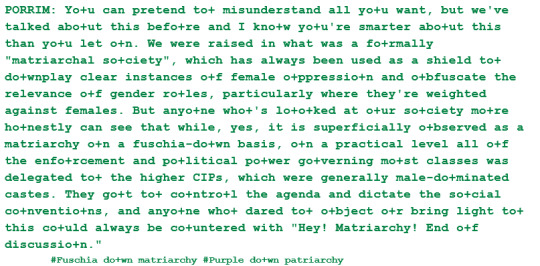
Yes, Beforus has a Matriarch... A Superficial Matriarch, where the woman in power is more of a Figurehead than anything. Law Enforcement and Politics are handled mostly by "Higher CIPs" - Ceruleans, Indigos, and Purples - which are predominantly born (hatched?) as men. ... If all of the Social Order and Politics are Enforced and Dictated by men... Then that... Is a Patriarchy.
So, we have it directly explained to us that Beforus is Superficially a Matriarchy, with a Governing Body largely composed by Highblood Men, who canonically benefit from the subjugation of women, because having women be of generally lower class than men means that... Men can cull women, potentially on the basis of being women. You know, that social system, enforced by the predominantly male-lead government that allows for what is essentially the ownership of people you deem incapable of caring for themselves as pets? The system that will take any excuse in the book? Sure, that may have been a social rule implemented by their version of HIC, Feferi fucking Peixes, but it's still being used as a weapon. Just because something was made by a woman, does not mean it cannot be used as a weapon against women in the name of misogyny. You think Alternian Culling doesn't work the same damn way?
There's a sharp cut of irony you have to feel at the fact that Porrim literally says that conversations of Misogyny on Beforus are often shot down using "The Matriarchy" as an excuse. If Misogyny wasn't a thing, why the fuck are Rufioh, Kankri, and Cronus literally, textually, purposefully Misogynists? Why the hell is Latula like that, then? I don't think this is a 1-to-1 allegory for the real world, man- Troll World Building has NEVER been a direct, clean allegory for the real world. I do not think she was ever intended to be read as an analogue to Men's Rights Activists, I think she was intended to be read as an Alien Feminist. If anything, this feels less like an MRA, and more like someone getting shut down for trying to have a conversation about how Misogyny Exists in, like, Thatcher-Era England or something. Well, there's a Female Prime Minister, isn't there? Misogyny is over, clearly.
Porrim is constantly posed as an Exposition Fairy on the same level as Aranea, just... With Politics and World Building rather than Character Analysis. Porrim is portrayed as cool, collected, and correct. Do you think Andrew Hussie - literal Andrew Hussie - would portray a fucking Men's Rights Activist with that level of grace and style? Because the answer is no! Every time a character is a Misogynist in Homestuck, they are comically terrible! Rufioh, Kankri, Cronus, fucking Caliborn! Hussie is a lot of things, and yeah, some of these things are bad, but none of these things include the label Misogynist. Hussie is well known for... Not doing that, actually, that's, like... A major appeal of the comic. The female characters in Homestuck are known for being really, really well written and really, really well handled!! If there was a Men's Rights Activist in Homestuck, we would know about it, because that character would be comedically terrible, constantly dunked on by everyone around him, totally bitchless, and posed as a relentless fucking menace who does not deserve to breathe the same air as any of the women in the story. You know, like Cronus! And Not Porrim!!
Also, can we all take a moment of silence to ponder how much of an L it is to have your entire point of discourse be based in the idea that straight up literal actual Kankri Vantas is correct? That is capital e Embarrassing.
#homestuck#homestuck meta#homestuck analysis#beforus#alpha trolls#beforan trolls#dancestors#porrim maryam#beforus.pdf#porrim.pdf#nekro.pdf#nekro.sms
284 notes
·
View notes
Note
your illiteracypunk post is very real but the point abt volunteerist activism where people burn out in 2 years rly hit me because i dont know how to not do that. like im worried thats what im engaged in rn and idk how to access any other avenues of action
Unless you're a very specific kind of person, the kind of structures you find predicated on voluntarism will burn anyone out, sooner or later, because the work cycle consists of riding between waves of reactivity and then suffering a lot inbetween because there is no real unified or disciplined sense of organized political work. If you predicate action on purely defensive means, when there is nothing to defend against that will draw people in your whole organization falls apart at the seams. Like I'm sorry to say but if you're not in an actually defined structure with its own specific program that is able to work towards that with its own regular strength, you will burn out. Democratic centralism or similar enough structures are not burnout-proof of course, and they allow for their own specific ways to burn out, but it's not baked into the logic of the very structure
95 notes
·
View notes
Text
"They know."
The entanglement between Will Graham and Hannibal Lecter is one fraught with manipulation, empathy, and a gradual dissolution of moral boundaries. Among the many manifestations of this dynamic, few are as structurally and thematically potent as the phone calls between Hannibal and Garret Jacob Hobbs in Aperitif, and Will to Hannibal in Mizumono. Although temporally and circumstantially disparate, these moments are deliberately interwoven, functioning as temporal markers in the evolving narrative of their mutual ensnarement. By examining the layered substrata embedded within these interactions, we discern the cyclical nature of influence and manipulation that constitutes the linchpin of Hannibal’s ontology: wherein power is neither imposed nor seized, but transacted—an unspoken recognition of each other’s latent capacities for violence, empathy, and control.
In order to grasp the profundity of both circumstances, there must be an understanding of the motivations that precipitated them. Hannibal’s call to Garret Jacob Hobbs, though executed with pragmatic brevity, belies a far more intricate set of intentions than initially suggested. At this stage in the narrative, the dynamic between Hannibal and Will is embryonic, subsisting on clinical curiosity—a regimen of dispassion Hannibal had grown accustomed to maintaining within the structure of his professional life. However, Will’s exceptional capacity for empathy was an anomalous force disrupting the measured architecture of Hannibal’s world, compelling him to consider avenues of a far more intimate nature. He saw in Will not merely a mind of peculiar brilliance, but a mirror—a potential companion. A conception potent enough to stir the abyssal ache of loneliness lurking beneath his polished exterior. This metaphysical hunger did not seek communion through the banalities of camaraderie, but the language with which he is most conversant: brutality. Crucially, this longing is filtered through Hannibal’s inability to engage with intimacy in any customary sense. Those loved by Hannibal are transformed, Abigail, Will, and even Alana endured respective reshapings under his hand. Love, as he conceives it, is not an act of gentle affection, but of sacramental violence—of devouring, refining, and rebirthing.


The phrase, "They know," offered under the pretense of courtesy, serves not Garret Jacob Hobbs, but Hannibal’s design. Affording Hobbs all the information necessary to ensure that his reckoning would be one of ferity, Hannibal sets the stage for the inciting act of Will’s initiation. Merely witnessing atrocity was insufficient—Will, no stranger to bloodshed, had to be implicated in its logic for the grimmer recesses of his psyche to resurface. The murder committed in the wake of the call is not merely an act of violence but a rite of passage—a trial by blood marking Will’s induction into the realm of existential violence Hannibal inhabits.
By the second season, the perilous symbiosis between Will and Hannibal has undergone an irrevocable shift, with Will now occupying a position of greater understanding and, to some extent, complicity. No longer a nescient pawn in Hannibal’s artifice, Will found himself reshaped by betrayal, incarceration, and the slow insidious seep of Hannibal’s influence—beholding his former confidant with tragic appreciation. What was once a relationship predicated on deception and power now throbs with an unsettling intimacy, of knowing and being known in a way that strips pretense to the bone, heedless of the ruin it invites. And so, as the loom of Hannibal’s retribution tightens its threads, Will acts in yet another betrayal of his espoused ethics, warning Hannibal with the very words that heralded his undoing: “They know.”


These mirrored phone calls do more than establish a warped parity; they elevate betrayal into an act of profane devotion. Superficially, the phone call suggests mutual recognition, a begrudging respect of each other’s prowess, their intellects so utterly interwoven that opposition and alignment have become indistinguishable. Yet, beneath this veneer of mutual acknowledgment roils an emotional undercurrent of unbearable complexity. Will’s call is not a simple warning—it is a moment of existential confirmation. Betrayal, in its conventional sense, implies a sundering. Though, in the case of Will Graham and Hannibal Lecter, betrayal is the mechanism that binds them. The call provides more than just a warning, it’s a gesture of terrible, inexorable recognition. Granting Hannibal something far more ruinous than treachery: understanding.
There is an aching irony in Will’s final call, a cruel paradox woven into the fabric of their bond. He, who has been both victim and agent of Hannibal’s machinations, now mirrors his adversary so exactly that the distinction between captor and captive collapses into irrelevance. In this fleeting moment, Will is not simply playing a part in the narrative Hannibal has orchestrated; he becomes its co-author. His warning is an unspoken confession, a testament to their enmeshment. Whatever semblance of love remains between them has been flayed to its barest form, pulsing with raw, excruciating knowing. Similar to the ouroboros, they are both devourer and devoured, their betrayals spiraling into one another in an endless recursion of destruction and genesis. There is no resolution, no terminus to their dance—only the certainty that in wounding one another, they are made whole, bound ever tighter in the embrace of ruin.
#hannibal#hannibal lecter#will graham#hannigram#nbc hannibal#hannibal nbc#garret jacob hobbs#writing
58 notes
·
View notes
Text
Load-bearing Superhumans
An early deconstructive thread in superhero comics of the 1980s, and one that was executed with varying levels of nuance and competence, was the idea that a superhuman trying to fix the world was actually just creating a world order terminally dependent on a specific individual to survive. In Magneto's first real outing with his iconic Claremontean characterization, his stated goal is to overthrow the existing cold-war era governments and build Utopia, with humans as the client-protectorate of a benevolent Mutant ruling class. Cyclops opposes the plan on the practical grounds that Magneto is describing a political order that's completely dependent on Magneto, personally, being around to enforce it, and Magneto is in his fifties; the best case scenario here is a thirty year golden age followed by total geopolitical implosion.
This is, similarly, the attempted thrust of Mark Gruenwald's 1985 deconstructive pastiche Squadron Supreme; after spending a year leveraging comic-book superscience to build a post-scarcity utopia, Superman-analogue Hyperion is smacked in the face with the realization that they've built a utopia predicated on the continued survival and good judgement of about a dozen individuals who've spent the last 12 issues sabotaging, mind-raping, assassinating and friendly-firing each other in typical bronze-age comic-book fashion. By the end of the book about half the roster is dead, AWOL or similarly compromised- including the one superscientist who built most of the tech on which Utopia was predicated- and Hyperion calls the whole thing off because he can read the writing on the wall that they simply won't be able to keep the wheels on the wagon under these genre constraints.


(Mind that this was a comic where a significant portion of the casualties are down to badly contrived lets-you-and-him-fight logic that would make Stan Lee blush-there's nothing in here that successors didn't execute on better. But the point is that this is something that capefic writers with two braincells to rub together have been thinking about for a long, long time.)
62 notes
·
View notes
Text
Conceptual Primitives and Lexical Universals
Substantives: I, You, Someone (Person), Something (Thing), People, Body
Determiners: This, The Same, Other
Quantifiers: One, Two, Some, Many/Much, All
Attributes: Good, Bad, Big, Small
Mental Predicates: Think, Know, Want, Feel, See, Hear
Speech: Say, Word, True
Actions, Events, Movements: Do, Happen, Move
Existence and Possession: There Is, Have
Life and Death: Live, Die
Logical Concepts: Not, Maybe, Can, Because, If, When (Time), Now, After, Before, A Long Time, A Short Time, For Some Time
Space: Where (Place), Here, Above, Below, Far, Near; Side, Inside
Intensifier, Augmentor: Very, More
Taxonomy, Partonomy: Kind Of, Part Of
Similarity: Like
Source ⚜ Writing Notes & References ⚜ Silent Letters ⚜ IPA Symbols
#writing reference#langblr#lexicon#writeblr#dark academia#spilled ink#literature#writers on tumblr#writing prompt#poets on tumblr#poetry#creative writing#writing inspiration#writing ideas#fiction#words#writing resources
141 notes
·
View notes